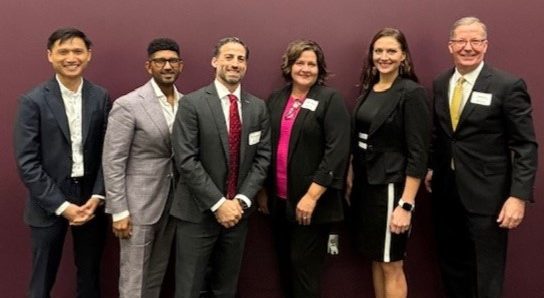Blog | Federal Investment
March 6, 2025
Lizzie Stricklin - Communications Manager, Business Council for Sustainable Energy | October 17, 2024
Louisiana is increasingly leveraging its leadership in the energy industry to pursue additive opportunities in new energy technologies such as liquified natural gas (LNG) exports, carbon capture and sequestration (CCS), and direct air capture (DAC).
This week in Baton Rouge, the Business Council for Sustainable Energy (BCSE) and Clean Energy Business Network (CEBN) were pleased to participate in Sen. Bill Cassidy (R-LA)’s Louisiana Energy Security Summit. Focusing on unleashing American abundance in a changing global landscape, the summit brought together leaders from the federal, state, and local government; industry; research community; and more. Speakers discussed strategies to expose threats to global trade and energy security, enhance U.S. competitiveness through Louisiana’s industrial exports, and strengthen U.S. geopolitical influence.
Throughout the day, Senator Cassidy and other policy and business leaders shared how U.S. companies are leading the way in developing innovative solutions to reduce carbon emissions across every economic sector – but particularly hard-to-abate sectors. Senator Cassidy also leveraged the event to discuss his proposed Foreign Pollution Fee Act, which seeks to capitalize on the U.S. advantage in manufacturing and energy production with lower greenhouse gas emissions and hold competitors accountable for their comparative lack of environmental standards.
BCSE members and partners in attendance discussed the role of clean energy projects in sparking economic development and creating new job growth for local communities. The BCSE coalition included representatives from Air Products, the American Clean Power Association, CarbonQuest, the Climate Leadership Council, CO2EFFICIENT, and the Solar Energy Industries Association.

CEBN President Lynn Abramson led a breakout session on industrial decarbonization. The panel of industry leaders and research experts discussed the diversity of technology solutions available to capture carbon, reduce industrial emissions, and ensure the United States maintains a competitive position in global markets.
New and exciting projects are currently in development throughout Louisiana, aiming to remove and store CO2 from the atmosphere, reduce carbon emissions, and improve air quality. Panelists shared case studies of business innovation and public-private partnerships, including:
Direct air capture: Project Cypress, a joint initiative by Climeworks and Heirloom, combines direct air capture (DAC) technology to remove excess CO2 from the atmosphere with long-term geologic storage to mitigate climate change. One of the first projects supported by the U.S. Department of Energy’s Regional DAC Hubs program, Project Cypress will employ a talented local workforce to make Southwest Louisiana a leader in deploying a new generation of clean industry.
Storing CO2 underground: Blue Sky Infrastructure’s Parish Sequestration Project will store at least 14 million metric tons of CO2 annually underground near the Geismar-Donaldsonville area. At least $50 billion of CCS investment is expected across the Louisiana Industrial Corridor over the coming decades to decarbonize existing and newly built facilities. The River Parish Sequestration project will serve as a large-scale and low-cost CO2 storage hub for the Louisiana Industrial Corridor and will help to catalyze this investment.
“The work that these new industries bring, it’s additive,” said panelist Douglas Chan, Chief Operating Officer of Climeworks. “It’s not replacing what is here today. That additive nature allows us to continue to build on the skills here [in Louisiana], and it helps to start that [energy] transition.”
Watch the breakout session discussion here.
###
To learn more about Louisiana’s emerging clean energy industries, see CEBN’s State of Clean Energy infographic series.
Find funding resources for emerging decarbonization technologies and more via CEBN’s U.S. Cleantech Funding Database.
About the author: Lizzie Stricklin is the communications manager for the Business Council for Sustainable Energy (BCSE). This blog was originally published by the Business Council for Sustainable Energy.